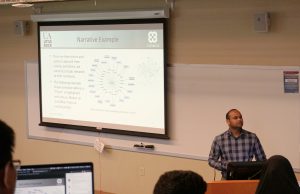On Friday, September 20th, doctoral candidate Kiran Kumar Bandeli presented his ongoing research on computational narrative analysis on blogs and social media at the EIT Colloquium.
“Blogs in particular act as virtual spaces where narratives are framed. It is therefore important to study and understand the way information is said by the actors on social media platforms,” Bandeli explained.
Narratives are organized, long-lasting themes and ideas that persist in discourses. It is challenging to extract narratives from social media, and even more so to interpret them. However, developing a more effective way to study these narratives carries great implications, paving the way for strategic communication on s

ocial media, impacting discourse and disinformation and in turn being able to counter those false narratives and avoid damaging society. “We could better address the concerns and needs of our citizens to respond to natural disasters, societal needs/concerns, safety issues, etc.”
The main obstacle has been finding an improved way to evaluate online narratives. Traditionally, this has been done manually, which is arduous and time-consuming. Being able to do this process computationally would save time, money, and allow for data collection on a broader scale. Bandeli’s research is doing just that.
He used multi-method approaches in order to try to operationalize the research and improve its reliability and validity.
Preliminary analysis has revealed interesting results so far. For example, sentiment analysis from blogs and social media between January 2015 and March 2016 revealed that the attitude towards migrants and refugees had a large increase in both positive and negative tones surrounding specific cultural events during that time.
Bandeli will present updates about his research in the near future.
About Kiran Kumar Bandeli:
Kiran Kumar Bandeli is currently a PhD Candidate at the Collaboratorium of Social Media and Online Behavioral Studies (COSMOS) at University of Arkansas at Little Rock in Computer and Information Sciences. His advisor is Dr. Nitin Agarwal. Kiran’s general research area is social media data analysis, narrative analysis, natural language processing, social computing and network analysis. His research interests include narrative analysis on social media, thematic analysis on blogs. Lately Kiran is working on event-based/narrative analysis in blogs. Kiran has co-authored more than 10 papers that include research on – disinformation activities on blogs, challenges and opportunities in blog data collection, analyzing shift in narratives, strategic integration of social media platforms in disinformation campaign coordination, and socio-computational analysis of YouTube videos. Kiran’s work has been published in NATO Strategic Communications Center of Excellence (StratCom COE) and Journal of NATO Defence Strategic Communications.
This research at COSMOS is funded in part by the U.S. National Science Foundation, U.S. Office of Naval Research, U.S. Air Force Research Lab, U.S. Army Research Office, U.S. Defense Advanced Research Projects Agency, Arkansas Research Alliance, and the Jerry L. Maulden/Entergy Endowment at the University of Arkansas at Little Rock. Any opinions, findings, and conclusions or recommendations expressed in this material are those of the authors and do not necessarily reflect the views of the funding organizations.
